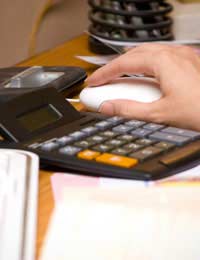Business Expenses

For those who’re just starting a new business at home understanding exactly which of your business costs can be offset against tax tends to be a source of great confusion.
Broadly speaking, there are two kinds of expenditure you can make for your business: purchasing capital such as equipment or property; or more ephemeral expenses such as hiring someone to design a logo for you. Each is treated differently. With capital allowances, the item is expected to continue in use for some time so you do not claim its entire cost in one year, only a proportion of it. In later years, you can claim further proportions of it. How much you should claim in each year varies from one item to another. You should consult an accountant for advice on how to approach this. By contrast, the full value of expenses can usually be claimed in the year in which they were incurred.
The golden rule of claiming expenses is that they must have been incurred “wholly and exclusively” in pursuit of business purposes. This becomes especially problematic for those working from home.
In some cases, there may be a very clear distinction between your home and business expenditures. For example, if you maintain separate telephone lines at home for your business and for your personal life, your business-related telephone expenditures will then be completely clear. If you have only one telephone, however, and use it for a mix of personal and business calls, the situation becomes trickier. Then you will have to itemise the business calls you make and claim for those only.
Many of the rules relating to businesses operating from home follow this general pattern. If the expenditure relates wholly to a business purpose, you can claim for it; if it relates partly to personal use and partly to business use, you must make an effort to quantify the total value of the business-related expenditures only. In some cases, estimates are acceptable, as long as they are well-grounded and you can justify them if necessary.
The same rules apply in relation to the costs of maintaining your home itself. For example, if you had a room in the house which was used as a home office, and only for that purpose, and by size it constituted roughly 10% of the total area of the house, you could claim for 10% of the house-related expenses such as electricity bills.
There are some things to be aware of if you plan to make any claims related to the house itself, though. First, if you claim that part of the house is used exclusively for business purposes, before long you may find that your local council wants to you to pay business rates! And if you later sell your home at a profit, the Treasury may demand a cut of the proceeds as Capital Gains Tax!
Travel-Related Expenses
Ordinary travel to work expenses are not claimable. If you are working from home, of course, these should not arise anyway. Making special trips to client sites is a claimable expense. The cost of lunch is not claimable, regardless of where you are.There are different ways of dealing with vehicle-related costs. The first is to make a careful record of each expenditure: every time you fill up with fuel, or pay a repair bill, for example, you must record the transaction and keep the receipts. An acceptable alternative, and one that is usually preferred, is to make claims on a mileage basis only. The treasury accepts vehicle-related claims at a rate of 40p per mile for the first 10,000 miles and 25p per mile thereafter.
Expert Advice
An article like this can only give a broad overview of the situation. You should seriously consider taking professional advice on the matter. The rules and regulations change from year to year and an expert will be able to advise you on how far you can go in making claims without running the risk of provoking an inquiry from the Inland Revenue. In many cases, you may be able to get professional advice for free if you contact government-run business support organisations. These are Business Link in England, Business Eye in Wales, Business Gateway in Scotland and, lastly, Invest NI in Northern Ireland.Conclusions
Dealing with taxes and the costs which can be offset against them is often one of the most confusing issues confronting the new business owner. When the business is run from home, there is an extra layer of complexity. Spending time familiarising yourself with the regulations, or taking professional advice on the matter, is highly recommended as it can save you money in the long run.Business energy with a difference
Looking for better business energy options? Whether it’s advanced monitoring, new connections, or adjusting capacity, our sponsor, Purely Energy can help.
📞 Call 0161 521 3400 or simply send us your details below for a no-obligation chat.
Sponsored by Purely Energy
Purely kindly sponsors this site. They help businesses deal with all aspects from securing the lowest prices, capacity upgrades, usage monitoring using their proprietory software, Purely Insights, and many other aspects. Need help with your commercial energy? Enter your details below and they’ll get back to you.
- Questionnaire: Claiming Expenses When Working from Home
- Taxing Issues Affecting People Working from Home
- Simplest Way of Keeping Accounts for Your Home Business
- Expenses Allowed for Home Workers
- Home Career: How to Achieve Better Cash Flow
- Questionnaire Taxation for a Small Business Working at Home
- Save Tax When Working From Home
- Business Help from the Government
- Pricing Your Services
- Business Expenses
- Home Business Contracts
- Finance for Your New Company
- Dealing with Income Tax
- Distractions in the Home



